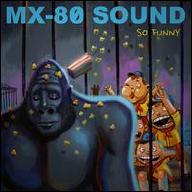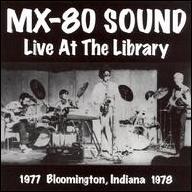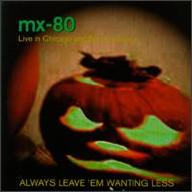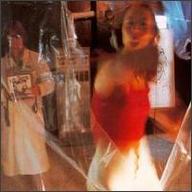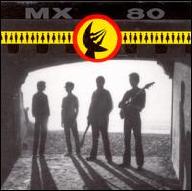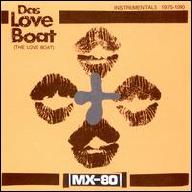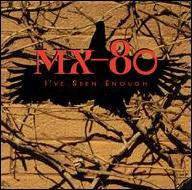MX-80 Sound was formed in Bloomington, Indiana by guitarist Bruce Anderson and bassist Dale Sophiea, who became friends while attending college. They both had a passionate interest in rock, enjoying the offbeat approaches of iconoclasts like Captain Beefheart and the Hampton Grease Band as well as free jazz pioneer Ornette Coleman and experimental composer Morton Feldman. Anderson and Sophiea joined an eccentric local band called Screaming Gypsy Bandits, and through them they met Rich Stim, a singer and multi-instrumentalist who had relocated to Bloomington from New York City. Stim and drummer Dave Mahoney had formed a group called Chinaboise, and they invited Anderson to play guitar on some material they were recording. Anderson meshed well with Stim and Mahoney, and he invited them to join a project he was forming with Sophiea and a pair of drummers, Jeff Armour and Kevin Teare. It soon became obvious that three drummers were overkill, so Teare dropped out, and in 1974, MX-80 Sound debuted in a two-drummer format.
MX-80 Sound were wildly prolific, rehearsing six nights a week and writing new songs at a breakneck pace (it's estimated they wrote over 300 pieces in their first five years), and they began making the rounds of Bloomington music venues. Their demanding performances generally meant they never played the same club twice, and it wasn't until they started playing free concerts at Bloomington's Monroe County Public Library that they started to develop a following. (Archival recordings of shows from 1977 and 1978 would be released in 2002 as Live at the Library.) In 1975, a local label, Bar-B-Q Records, issued a compilation of local artists, Bloomington 1, that included MX-80 Sound's first publicly released recording, "Spoonfight." (It also featured tunes from Chinaboise and the Screaming Gypsy Bandits.) In 1976, Bar-B-Q brought out the group's first EP, Big Hits: Hard Pop from the Hoosiers, which crammed seven songs onto a seven-inch vinyl disc. The record was reviewed in the British music newspaper Sounds, and Howard Thompson, then an A&R man for Island Records, was intrigued by the write-up and sought out a copy of Big Hits. After hearing it, he contacted the band and offered them a deal with Island; he gave them a modest advance, and Mark Bingham, a musician and recording engineer who has been documenting their work, produced 1977's Hard Attack at a small studio in Bloomington. Though Hard Attack won some enthusiastic reviews, it was a tough sell, and Thompson's superiors at Island didn't care for the record. Island opted not to release it in the United States, and shortly after Thompson left the label, MX-80 Sound was dropped.
Eager to find a more receptive audience for their efforts, MX-80 Sound moved to San Francisco in 1978. Their avant-metal sound was not immediately embraced by the local punk scene, and drummer Jeff Armour left the group, so they carried on as a quartet. Thankfully, they found sympathetic ears at Ralph Records, the Bay Area label founded by the Residents. The group cut two albums for Ralph -- 1980's Out of the Tunnel and 1981's Crowd Control -- that were well-received in the underground music press, and Ralph included them on their budget-priced "Buy or Die!" samplers that spread the word to curious listeners across the country and around the world. However, their popularity hit a plateau, and in 1982, Rich Stim took a sabbatical from the group to attend law school. Soon afterward, Dave Mahoney would also resign, and for a while a provisional lineup featured Anderson and Sophiea with two former members of the San Francisco band the Mutants, bassist and guitarist Jim Hrabetin and drummer Marc Weinstein. MX-80 Sound launched their own independent label, Quadruped, that specialized in cassette-only releases from offshoot groups Half-Life and O-Type as well as solo recordings from Anderson. In 1987, Quadruped issued the album Existential Lover, which was recorded by Stim, Anderson, and Sophiea, with the latter serving double duty on bass and drum programming. It was credited to MX-80, in part due to a legal dispute with a former manager regarding use of the original name.
The core of MX-80 was still performing live and recording under the monikers O-Type and the Gizzards before they struck a deal with Chicago's Atavistic Records to release I've Seen Enough in 1995. At this point, the lineup featured Rich Stim, Bruce Anderson, Dale Sophiea, Marc Weinstein, and keyboard player David Immergluck. Two years later, they brought out another album through Atavistic, Always Leave 'Em Wanting Less, assembled from live recordings of shows in Chicago and San Francisco, with second guitarist Jim Hrabetin back in the lineup and Immergluck missing.
By the time the live set had come out, Dave Mahoney had begun working with the band again, and he participated in the making of 2005's We're an American Band, an unusual project that was created in the home studios of the various members of the group. It was the swan song for Mahoney, who died in June 2006. 2015's So Funny (which found them returning to the name MX-80 Sound) was another experiment in unconventional recording. With Mahoney gone from the band, Rich Stim programmed percussion patterns for the songs, and after recording his vocals over them, the other musicians added their parts. However, in a bid to replicate the two-drummer sound of their early work, Dale Sophiea's son, Nico Sophiea, later overdubbed live drums over Stim's electronic percussion. MX-80 was working on new material in 2018 when Bruce Anderson suffered an epileptic seizure that resulted in severe memory loss but didn't impact his ability to play guitar. As Anderson set out re-learning the last several years of his life, he began having strange and vivid dreams, and with help from Stim, he began fashioning them into a song cycle about a family of criminals. The result was the album Hougher House, which was released in January 2022. In a sad coincidence, Bruce Anderson died at his home in San Francisco on January 11, 2022, just as the album was becoming available. Before his death, he completed work on a final album, Better Than Life, for release in 2022. ~ Mark Deming, Rovi


